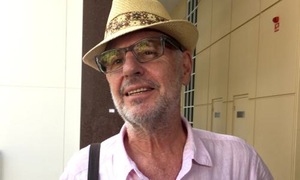
Voluntary euthanasia campaigner Philip Nitschke tacitly approved of the suicide of Perth man Nigel Brayley by not questioning him further about his health and not preventing him killing himself, a Darwin court has heard.
The supreme court will decide whether the Health Professional Review Tribunal was right to uphold Nitschke’s suspension by the Medical Board of Australia (MBA).
The board has accepted that Nitschke and Brayley did not have a doctor-patient relationship, but said he did not go far enough to assess Brayley’s health and condoned his suicide.
The two met at a workshop run by the voluntary euthanasia group Exit International, where Nitschke informed people of options for ending their lives.
Brayley, at 45, was younger than the minimum age of 50, but Nitschke permitted him to attend, and the two went on to exchange emails.
They revealed that Brayley, who was being investigated for his involvement in the death of his former wife and disappearance of a former girlfriend, did not want to discuss his personal circumstances and had bought the euthanasia drug Nembutal and a testing kit to ensure it was pure, before telling Nitschke he planned to end his life within two weeks.
An MBA lawyer, Lisa Chapman, told the court on Thursday: “That he not only makes no inquiry whatsoever, but actually says words to the effect of: ‘I look forward to reading your final statement’, as in suicide note, is condoning the express intention of Mr Brayley [to die].”
“Not only that, but he gives statements to the media that this will happen again because ‘this is what I believe; I believe any person who is not sick can make a rational decision to kill themselves and there is no role for the medical board in that’.”
She said Nitschke had an ethical responsibility to ask Brayley more questions about his mental state and to possibly refer him to another doctor.
But Nitschke’s lawyer argued on Wednesday that a doctor could not compel a person to become their patient against their wishes, and said it would be an enormous burden for doctors if they were to bear responsibility for every negative health decision made by people they encountered.
The court is not determining whether Nitschke acted unethically, but whether it was appropriate for the tribunal to uphold his suspension until his next hearing before the board in July.
The hearing continues.
- For support and information about suicide prevention call Lifeline on 13 11 14 or Suicide Call Back Service on 1300 659 467
